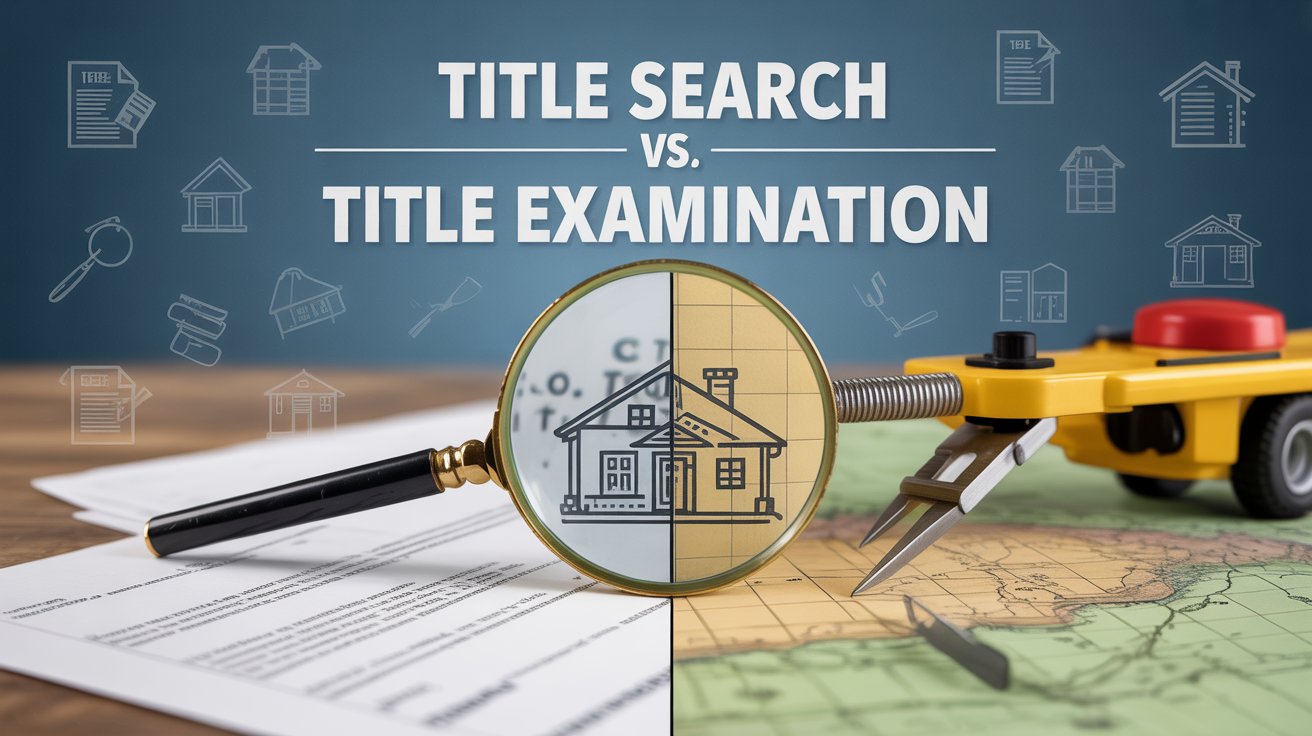Title Search vs. Title Examination: What Every Homebuyer Should Know Before Closing?

Strong 8k brings an ultra-HD IPTV experience to your living room and your pocket.
When you're about to close on a home, two important steps often come up title search and title examination. While they may sound similar, they serve different purposes in the real estate transaction process. Understanding the distinction between the two can save you time, money, and a lot of legal trouble in the future.
What Is A Title Search?
A title search is the process of reviewing public records to trace the ownership history of a property. It helps verify that the seller has the legal right to sell the home and that the title is free from issues like liens, unpaid taxes, judgments, or conflicting ownership claims. Title searches are usually performed by a title company or a real estate attorney.
Key Points:
- Confirms the rightful owner of the property
- Identifies any existing liens, encumbrances, or restrictions
- Searches through county and municipal records for accuracy
What Is A Title Examination?
A title examination comes after the title search and is a deeper analysis of the information uncovered. An expert, usually a title officer or underwriter, evaluates the records to determine whether the title is clear or if any issues could affect ownership or transfer. This step ensures that all discovered documents are interpreted correctly and that nothing legally prevents the sale from proceeding.
The Title Examiner:
- Reviews all recorded documents (deeds, easements, wills, etc.)
- Evaluates potential legal implications of title issues
- Prepares a title commitment, which is essential before issuing title insurance
Why Are Both Steps Important Before Closing?
These two steps work together to protect buyers and lenders. A flawed title can result in disputes, foreclosure, or loss of investment. That’s why mortgage lenders require both a thorough title search and examination before approving the loan and issuing a policy.
Companies like Stellar Innovations Bangalore, which specialize in mortgage automation and title services, are transforming how quickly and accurately these processes are handled. Their advanced tech stack including intelligent document processing and automation tools helps accelerate turnaround times and reduce the risk of human error during title analysis. This ensures higher transparency for homebuyers.
What Can Go Wrong Without These Steps?
Skipping either step can lead to:
- Unexpected legal disputes over ownership
- Undisclosed liens or mortgages that become your responsibility
- Delays in closing due to missing documentation or legal issues
- Ineligibility for title insurance, leaving you financially exposed
The Role of Title Insurance in the Proces
Once the title search and title examination are completed, a title insurance policy is typically issued. This policy is crucial because even the most thorough search can’t uncover every potential issue. Some problems like forged signatures on deeds, errors in public records, or missing heirs—can remain hidden until after the transaction closes. Title insurance protects both the homebuyer and the lender from financial losses due to such claims.
There are two main types:
- Lender's Title Insurance (required by most mortgage lenders)
- Owner’s Title Insurance (optional but strongly recommended)
Without title insurance, a buyer might be forced to pay legal fees or even lose the property if an ownership dispute arises. With it, you gain peace of mind that you're covered even if a hidden issue surfaces years later.
How Title Issues Can Affect Your Investment?
Title problems can have a significant financial and emotional impact. Suppose a prior owner failed to pay property taxes, or an ex-spouse of a previous owner never signed off on a deed—these oversights could lead to legal battles, liens, or ownership disputes. In worst-case scenarios, buyers have lost their homes because another party had a stronger legal claim.
Here are some real risks:
- Boundary disputes with neighbors that affect your use of the land
- Unrecorded easements giving others access to your property
- Clerical errors in public documents that cloud the title
- Unknown heirs who suddenly claim rights to your home
Final Thoughts
Before signing any real estate contract, it’s crucial to understand both the title search and title examination processes. They provide peace of mind and help prevent legal complications down the road. When combined with technology-driven platforms, like those used by Stellar Innovations Bangalore, these processes become even more efficient, accurate, and buyer-friendly.
Frequently Asked Questions
What’s The Difference Between A Title Search And A Title Examination?
A title search identifies the property’s ownership history and liens, while a title examination evaluates those findings to assess the legal clarity of the title.
Can A Homebuyer Perform A Title Search On Their Own?
While possible, it’s highly recommended to have a professional title company or attorney perform the search to ensure accuracy and legal compliance.
Is A Title Examination Required For Every Home Purchase?
Yes, especially when title insurance is involved or if the transaction is financed through a lender.
What Kind Of Problems Can A Title Search Uncover?
Common issues include unpaid taxes, unknown heirs, forged documents, or undisclosed easements.
How Does Technology Help With Title Search And Examination?
Modern platforms like Stellar Innovations Bangalore use automation to speed up document retrieval, reduce human error, and streamline the analysis process.
Note: IndiBlogHub features both user-submitted and editorial content. We do not verify third-party contributions. Read our Disclaimer and Privacy Policyfor details.






